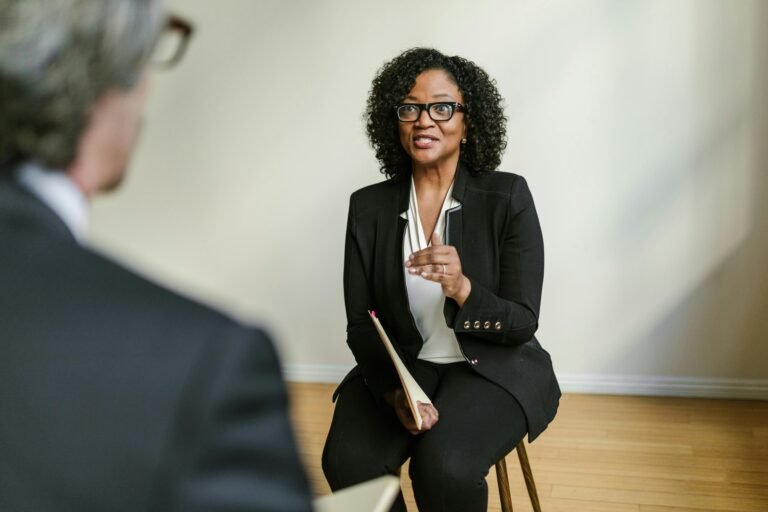If you’re applying for a summer camp job—whether as a counselor, activity leader, or support staff—you’ll likely face interview questions that ask you to reflect on how you’ve handled real-life situations. That’s where the STAR method comes in.
STAR stands for Situation, Task, Action, and Result, a simple yet powerful way to structure your answers to behavioral interview questions. It helps you tell your story clearly while showing interviewers that you’re thoughtful, resourceful, and ready to handle camp life.
In this guide, we’ll walk through 10 original STAR-based examples tailored to common summer camp interview questions. Use them as inspiration to prepare your own honest, experience-based answers, even if it’s your first time working at a camp.
Interview Questions with Sample STAR Responses for your Summer Camp Job Interview
Tell me about a time when you had to handle a difficult situation with a camper.
Sample Response:
Situation: Last summer, I was leading a group of 8- to 10-year-olds, and one camper frequently interrupted activities—shouting during games and ignoring instructions.
Task: I needed to address the behavior without singling them out or disrupting the flow of camp for everyone else.
Action: I pulled the camper aside during a break and calmly asked what was going on. He admitted he missed home and felt left out. I gave him small roles—like helping set up materials or leading the line—to help him feel more involved. I also kept a close eye on his mood and gave him positive feedback whenever he participated respectfully.
Result: Within a couple of days, his behavior improved dramatically. He was more engaged, started making friends, and even became a leader in his group. That experience taught me the value of empathy and the impact of small, intentional actions.
Tell me about a time when you worked with a team to plan and run an activity.
Sample Response:
Situation: At my last camp job, a group of us counselors were in charge of planning the big end-of-session “Camp Olympics” for over 60 campers.
Task: Our goal was to create a smooth, fun, and safe event that included multiple activities for different age groups and abilities.
Action: I helped outline the day’s schedule and divided up responsibilities among the team. I took charge of setting up the relay race area and making sure we had all the supplies for each station. I also worked closely with the junior counselors, giving them clear roles so they felt included. We held a few quick check-ins throughout the day to stay on track.
Result: The day was a hit. Campers were laughing, cheering each other on, and fully engaged. Parents later mentioned how much their kids loved the event. It was a great example of how communication and shared leadership can make even a complex event run smoothly.
Tell me about a time when you had to manage multiple tasks at once.
Sample Response:
Situation: During one especially busy camp day, I was juggling leading a hiking group, organizing lunchtime setup, and prepping for a craft activity in the afternoon.
Task: I had to keep everything moving on schedule while making sure campers were safe, engaged, and having fun.
Action: The night before, I made a quick checklist and timeline for each activity. During the day, I leaned on my co-counselor for support and made sure to check in often to adjust as needed. When our hike went longer than expected, I texted ahead to have lunch pushed back slightly, and I combined prep time for crafts with a storytelling game to keep kids occupied.
Result: We stayed on track, and the kids had a great time. My director later thanked me for staying calm and resourceful under pressure. That day really cemented my confidence in multitasking without losing focus on the campers.
Tell me about a time when you helped a shy camper feel more comfortable.
Sample Response:
Situation: One camper in my group was very quiet and often sat out of games during the first few days.
Task: I wanted to help him feel safe, included, and eventually excited to participate.
Action: I started by inviting him to help me set up cones before games—just the two of us. We chatted while working, and I learned he liked drawing. So I brought out chalk and suggested he design the game zones on the blacktop. That led to another camper joining in, and soon they were drawing together. The next day, he joined in on our group activity without prompting.
Result: By the end of the week, he had made several friends and volunteered to lead one of the games. It reminded me how much a small connection can change a camper’s whole experience.
Tell me about a time when you responded to an emergency.
Sample Response:
Situation: One afternoon, a camper slipped on wet grass and twisted her ankle during a relay race.
Task: I needed to keep her calm, get help quickly, and ensure the other campers stayed safe and calm as well.
Action: I immediately got her seated, reassured her, and kept her still. I signaled to another counselor to get the camp medic while I stayed with her and kept the group focused on another game a short distance away. I followed up afterward by checking in with her and her parents.
Result: She recovered quickly and was back to activities by the next day (with some modifications). The staff appreciated how I handled things quickly and calmly. It reinforced how important it is to stay prepared and not panic in the moment.
Tell me about a time when you managed a conflict between campers.
Sample Response:
Situation: Two campers in my group were constantly butting heads during team activities.
Task: I needed to help them work through their tension without disrupting the group dynamic.
Action: I spoke with each camper individually to understand their side of the story. Then I brought them together for a short, guided conversation where we talked about what respect looks like in a team. I helped them set a few ground rules for how they’d work together going forward. I also made sure to praise them both for working through it.
Result: They didn’t become best friends overnight, but the tension eased, and they started cooperating during activities. One even passed the ball to the other during a game later that week—huge progress. It reminded me how important it is to create space for understanding.
Tell me about a time when you had to change plans due to unexpected circumstances.
Sample Response:
Situation: One morning, a thunderstorm rolled in and forced us to cancel all our outdoor activities.
Task: I had to quickly come up with an indoor alternative that kept 25 energetic campers engaged—and didn’t require special equipment.
Action: I organized a “Camp Room Challenge,” which included indoor games, team trivia, and a creative building contest using recyclables we had in the storage closet. I rotated campers through stations to keep it dynamic and gave each team a fun theme name.
Result: The campers had such a good time they asked to do it again later that week—even when the sun came back out. It was a good reminder that flexibility and a little imagination can save the day.
Tell me about a time when you prioritized safety during an activity.
Sample Response:
Situation: I was supervising a swimming session with a group of 12 campers, some of whom were less confident swimmers.
Task: My job was to keep a close watch, enforce safety rules, and respond quickly if anything went wrong.
Action: I gave a quick pre-swim safety talk, had campers use color-coded wristbands based on their swim level, and stayed near the shallow end with our beginner group. I also rotated supervision zones with another counselor to stay alert.
Result: The entire session went smoothly, and all campers had fun and stayed safe. My supervisor told me she appreciated how seriously I took the safety protocols. It was a great example of how preparation and clear boundaries can make high-risk activities feel safe and fun.
Tell me about a time when you helped re-engage disinterested campers.
Sample Response:
Situation: During a rainy day craft session, several campers were bored and disengaged—they clearly weren’t into the activity as planned.
Task: I wanted to reignite their interest and find a way to make the session more fun and hands-on.
Action: I asked the group if they wanted to turn the session into a “mini makers’ fair,” where they could design anything they wanted using the supplies. I introduced fun challenges like “build the tallest tower” or “design a new camp mascot.” I made sure to celebrate their ideas, no matter how silly.
Result: Suddenly everyone was into it—laughing, helping each other, and showing off their creations. That moment reminded me how giving kids a little ownership can completely shift their engagement.
Tell me about a time when you supported a homesick camper.
Sample Response:
Situation: On the second night of camp, one camper in my cabin was quietly crying and said she missed her parents a lot.
Task: I wanted to help her feel supported without making her feel embarrassed or isolated.
Action: I sat with her while the others were brushing their teeth and asked about her family
and what she missed. I shared a quick story about my first time at camp and how nervous I’d felt too. I invited her to help me plan a silly skit for the next day and offered to write a note home together. I also made a point to pair her up with a kind camper who’d been coming to camp for years.
Result: She ended up becoming one of the most enthusiastic campers by the end of the week—and even said she wanted to come back next summer. Her parents sent a note saying how much it meant to them. That experience reminded me how powerful a little patience and connection can be.
In Closing
The STAR method is more than just a way to answer interview questions, it’s a tool that helps you share who you are and how you show up for others. Whether you’re helping a camper feel seen, stepping up in a team project, or thinking on your feet when plans change, your stories matter.
So take time to reflect, practice your responses, and speak from your real experiences. Camp directors are looking for more than just perfect answers, they’re looking for people who lead with heart, adapt when it counts, and help kids have an unforgettable summer.
Best of luck on your summer camp job interview and remember that you’ve got this; we’re cheering you on.
Related Posts
Top 10 Interview Questions for Summer Camp Counselors and How to Answer Them
How to Use the STAR Method to Answer Interview Questions
How to Conduct a Self-Assessment to Identify Your Strengths and Weaknesses
Sample Resume: Experienced Summer Camp Counselor









